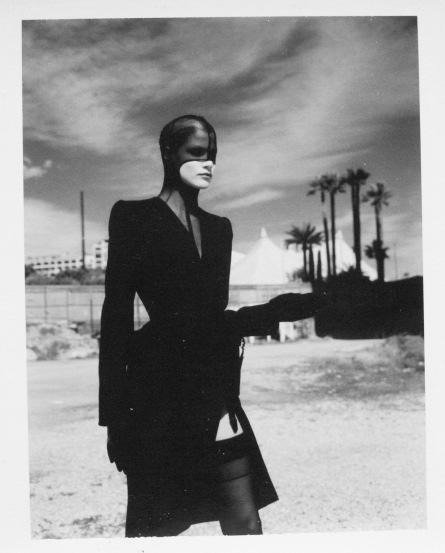Helmut Newton
dal 8/6/2011 al 19/11/2011
Segnalato da
8/6/2011
Helmut Newton
Helmut Newton Foundation, Berlin
For the first time ever, over 300 works based on the original Polaroids offer a comprehensive overview of this aspect of Newton's oeuvre. Starting in the 1970s, Helmut Newton used this technology intensively, especially for his fashion photo shoots. As he once described in an interview, this satisfied his impatient urge to want to know immediately how a certain situation would look as a photograph. In this context, the Polaroid acted as an idea sketch in addition to testing the actual lighting situation and image composition.

As of June 10th, 2011, the Helmut Newton Foundation in Berlin will be presenting the latest
exhibition 'Helmut Newton Polaroids'.
For the first time ever, over 300 works based on the original Polaroids offer a comprehensive
overview of this aspect of Newton’s oeuvre. Starting in the 1970s, Helmut Newton used this
technology intensively, especially for his fashion photo shoots. As he once described in an
interview, this satisfied his impatient urge to want to know immediately how a certain situation
would look as a photograph. In this context, the Polaroid acted as an idea sketch in addition to
testing the actual lighting situation and image composition.
In 1992 Newton published Pola Woman, an unconventional book consisting only of his Polaroids.
According to the photographer, the publication lay particularly close to his heart, although it was
discussed amidst great controversy.
In response to the accusation that the images in the book were not perfect enough, he countered:
“But that was exactly what was exciting – the spontaneity, the speed.”
Polaroid technology revolutionized photography. Those who have used a Polaroid camera can
hardly forget the unique odor of its developing emulsion and the thrill of the instant image. With
the Polaroid, every image is one of a kind. This also applies to the later large-format Polacolor
prints, whose developing process left behind characteristic borders. Polaroids have thus been
frequently used for preliminary studies as well as a standalone medium. This was already the
case early on, following the creation and presentation of the instant photograph at the Optical
Society of America in 1947 by its inventor, Edwin Land – and especially after he presented in
1972 the legendary SX-70 System, a collapsible, simple and affordable camera. In nearly all
photographic areas – from landscape and genre, portrait and self-portrait, fashion and nudes –
this unique imaging process has found enthusiastic devotees all over the world.
Newton’s additional notes, written on the edges of the Polaroids, are fascinating as well as
revealing with regard to the model, client or location and date. The comments, the haziness of the
images and the signs of use are naturally also to be found on the enlargements of the Polaroids
included in the exhibition; they testify to a pragmatic approach to the original work materials,
which have now possess an own inherent value. Especially interesting for today’s viewer is the
unique Polaroid aesthetic that unexpectedly alters the colors and contrast of the photographed
subject.
In the end, the exhibition 'Helmut Newton Polaroids' does not only grant an insight into the
underlying pictorial ideas of Newton, but also resembles a sketchbook of one of the most
influencial and important photographers of the 20th century. Many of the iconic photographs that
have already been presented in the exhibition space of the Helmut Newton Foundation can be
discovered in the current exhibition in the process of their creation.
The exhibition will be accompanied by a trilingual (German, French, English) publication by
TASCHEN. Hardcover, 8.3 x 10.8 in., 224 pages, price: 39.99 EUR, ISBN: 978-3-8365-2886-3
Press contact
nadine dinter - public relations
Fasanenstraße 70, 10719 Berlin
phone: +49 (0) 30 398 87 411
mobile: +49 (0) 151 123 70 951
press@helmut-newton-foundation.org
presse@nadine-dinter.de
Image: Helmut Newton, Thierry Mugler, Monte Carlo 1998, Polaroid © Helmut Newton Estate
Press conference: Thursday, June 9th, 2011, 11 am
Opening Thursday, June 9th, 2011, 8 pm
Helmut Newton Foundation
Jebensstrasse 2, Berlin
Hours: Tuesday – Sunday 10 a.m. – 6 p.m.
Thursday 10 a.m. – 10 p.m.
Entrance Fee: 8 € / 4 € concessions



